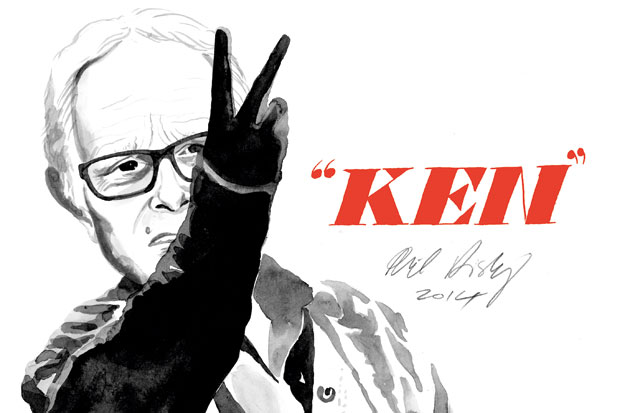‘If you want to send a message,’ said Sam Goldwyn, one of the men who invented Hollywood, ‘try Western Union.’ It is such a well-known remark one might have thought every film-maker of the past 50 years would have acted upon it. Not Ken Loach. After half a century of fighting the good fight on behalf of the poor, down-trodden working class, the grumpy Oxford graduate releases his latest film this week. Don’t all rush at once.
Jimmy’s Hall, it will surprise nobody who has followed Loach’s work over the years to learn, pits an Irish socialist recently returned from America against the local priest. The screenplay, as ever with Loach, comes from the fair hand of Paul Laverty, who is usually described as a Scottish ‘human rights campaigner’. Wake up at the back! They’re doing this for your benefit.
Yes, Loach is once more at his exercise. And once more the critics will roll out the usual phrases to honour him — the grand old man of British cinema, our very own iconoclast, and such like. The one word you won’t read, because it is considered poor form, is ‘bore’. Yet that is what he is. Loach is no heir to Powell, Lean, Hitchcock and Reed. He is a one-man wind farm.
To give him his due, he seems, a month before his 78th birthday, to have got the message. Speaking at Cannes last week, he said he wasn’t sure his films had deepened people’s understanding of working-class lives. Though, naturally, it wasn’t his fault. ‘They cannot stand working-class characters who speak with some knowledge,’ he said.
In this case ‘they’ were film critics. From what he has said in the past, however, it could be anybody. Americans, Zionists, Conservatives: Loach feels oppressed by them all. They all stand in the way of the master’s vision. Only one thing is for sure. Not many people, working-class or otherwise, want to watch his films. Even critics, one feels, see them out of a sense of duty.
With one exception. In 1969, Loach made Kes, one of the finest films of post-war English cinema. Adapted from the novel by Barry Hines about a Yorkshire boy’s relationship with a kestrel (A Kestrel for a Knave), it still scrubs up well 45 years later. Brian Glover’s performance as the sadistic, cheating PE teacher (‘Casper, get off that crossbar!’) has become part of British folklore.
If only Loach had made more films like Kes. Instead, rather than showing, he made the bore’s mistake of opting to tell, with ever-diminishing consequences. Loachland occupies a world of permanent grievance, at home and abroad, with ‘issues’ getting in the way of the tale. Hidden Agenda was about Northern Ireland, Carla’s Song was set in Nicaragua, Land and Freedom took us to the Spanish Civil War. Tick, tick, tick.
There are good films to be made in these settings, and film-makers have made them. But Loach is so keen to parade the virtue of those he feels have been robbed of a voice (thereby parading his own virtue as the one person who can hear their song) that the films sink under the weight of so much unnecessary baggage. Think of what Jean Renoir intimated about class divisions in La Règle du jeu, and then watch a Loach film, and the chasm stretches wider than just the English Channel. Renoir was an artist. Loach is merely a propagandist.
Like many propagandists, he came from a cosy background. At Oxford, a friend of mine who was up with him remembers ‘a dandy, a Noel Coward figure. Never have I seen such a transformation.’ It’s not that uncommon. Joe Ashton, the former Labour MP who came from true proletarian stock, once mocked Tony Benn’s idolatry of working people with a remark that was intended to wound: ‘If he knew anything about them, he would know there are as many shits among the working class as any other group of people.’
It is palpably untrue in any case to suggest that working-class people have never been given a voice in English cinema. Films like Room at the Top, A Taste of Honey, A Kind of Loving, This Sporting Life, Saturday Night and Sunday Morning and The Loneliness of the Long Distance Runner transformed our way of seeing the world as well as making stars of Alan Bates, Albert Finney, Richard Harris and Tom Courtenay. With Kes, Loach helped to add a verse to the chorus.
There is an irony here, a delicious irony in the week that Ukip have taken such a bold step in the political life of the nation. Had Loach kept his eye on the ball in the past two decades, he would surely have noticed that the things that truly affect working-class folk do not always correspond with the issues that people like Loach deem important.
By trying to speak on their behalf, Loach has revealed himself to be woefully out of touch. But it’s not too late. There is still time for the grand old man to tackle (as the socially engaged like to say) subjects like immigration and the rise of Islamism in our cities. Seen from a truly working-class perspective. If Loach bothered to find out what those people really thought, he might get the sort of unscripted shock that produces a memorable film.
Got something to add? Join the discussion and comment below.
Get 10 issues for just $10
Subscribe to The Spectator Australia today for the next 10 magazine issues, plus full online access, for just $10.
You might disagree with half of it, but you’ll enjoy reading all of it. Try your first month for free, then just $2 a week for the remainder of your first year.














Comments
Don't miss out
Join the conversation with other Spectator Australia readers. Subscribe to leave a comment.
SUBSCRIBEAlready a subscriber? Log in